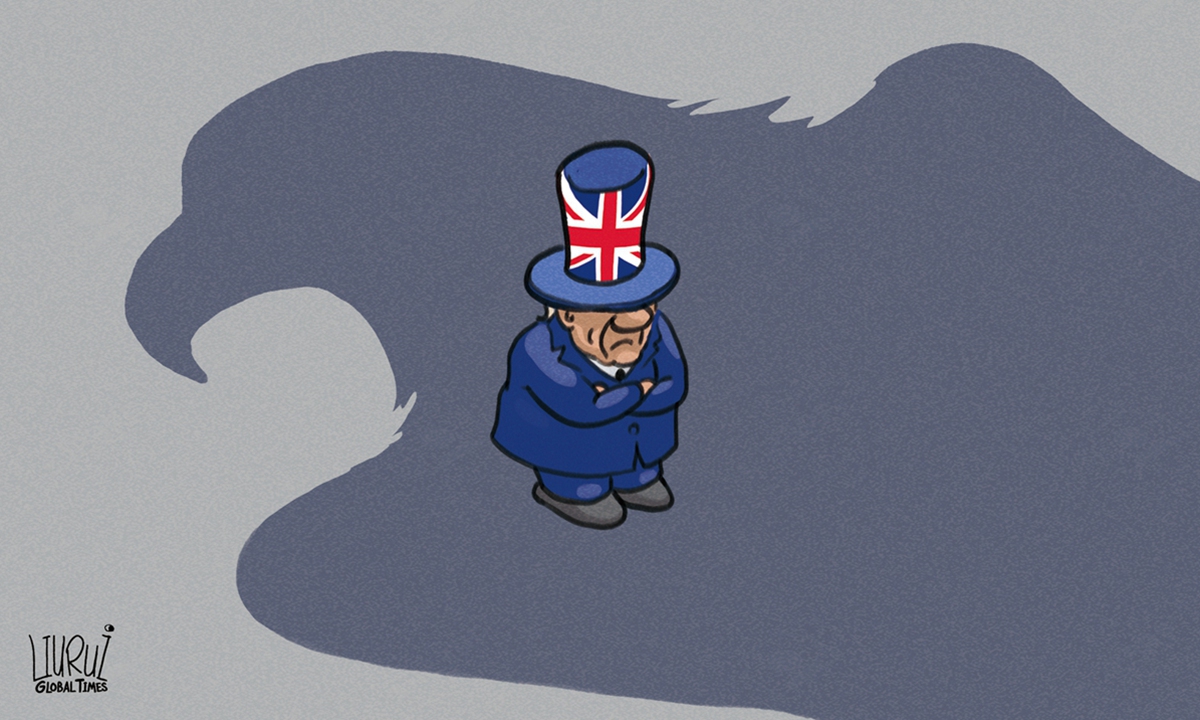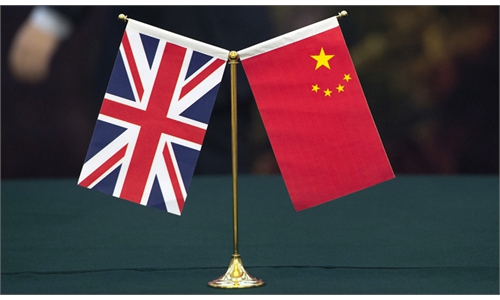
UK US relations Illustration: Liu Rui/GT
While Britain is going downhill, some of its politicians are still irresponsibly stepping on the gas. If they continue to be unscrupulous on the road of inciting anti-China sentiment, will the onetime empire “on which the sun never sets” usher in darkness?In a new report released on Sunday, the UK’s Commons Foreign Affairs Committee (FAC) warned that “China poses a significant threat to the UK on many different levels” and the MPs “support the Government changing the language from ‘systemic competitor’ to ‘threat.’”
For the sake of their own political gains, some UK’s anti-China politicians have repeatedly pushed the government to be tough on China. Chair of the FAC Alicia Kearns, who has been seen as a China hawk, led a delegation to visit the Taiwan island at the end of November, seriously challenging China's core interests.
According to Gao Jian, director of the Center for British Studies at Shanghai International Studies University, these British MPs’ offensive remarks on China are extremely irresponsible to the British people as well as the country’s national interests. Against the backdrop on which the UK has repeatedly underlined that it intends to build a “global Britain,” without stable and sound bilateral relations with China, the UK's diplomatic vision cannot be realized.
The UK's national strength is much weaker than it used to be. Notably, this year, its economy is sliding into recession in light of the heavy hit by the ongoing Russia-Ukraine conflict. This will have a profound social impact on the UK. Instead of devoting to tackling the problems, these MPs are making groundless remarks which may make the situation even worse, noted Gao.
The Financial Times on December 13 reported that corporate insolvencies are set to peak at a higher level than the last financial crisis as companies struggle with inflation and falling demand.
Today, when London is incapable of addressing its internal and external difficulties, some British politicians regard anti-China as a life-saving straw, but eventually, it will be the British who pay for this misperception. Furthermore, it is difficult to keep the anti-China drama playing. Given the pressure of the election, without properly coping with the economic plight and improving the public’s well-being, how can they gain more support?
Britain is a country founded on commerce and free trade. Today, the country's economic growth is mainly generated by trade. If the UK loses such a huge market as China, the future of the UK is even less promising.
In spite of their concerns, the MPs wrote in the report that the government should continue to work with China on“key areas,” insisting this was vital for pursuing some global goals, such as the fight against climate change.
“Being tough on China while maintaining cooperation with the country has become the basic logic of some British politicians' manner toward China, but it is just their wishful thinking,” Cui Hongjian, director of the Department of European Studies at the China Institute of International Studies, told the Global Times. “The UK should have an accurate understanding of its own position. Now, the dominance of China-UK relations is not in the hands of the UK.” Once there is a move that substantially impairs China's core interests from the UK, China has many ways and means to counter the UK.
In contrast to the UK, leaders of the EU and those from European countries like Germany have recently paid a visit to Beijing, in a bid to seek cooperation with China. It seems that the UK's China policy is drifting away from the European continent. After Brexit, the UK has been lost and failed to find an accurate positioning.
In order to highlight its specificity, the UK strives to keep a distance from the European continent in its foreign policy, including its China policy. Instead, Britain is closely following the pace of the US in this regard.
The South China Morning Post published an editorial entitled “When it comes to China, Britain should decouple from the US.” It said that “There is every reason for Beijing and London to have good relations, even if they have differences on various issues.”
It is time for the UK to re-examine its China policy. With the economy shrinking, some British politicians are still following the US in hyping the so-called China threat. What consequence will the UK get? British decision-makers should not be blinded by those short-sighted politicians’ anti-China rhetoric.

